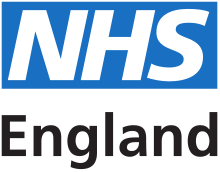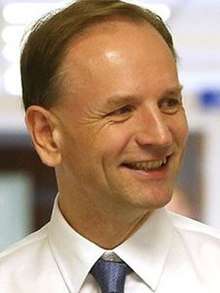NHS England
NHS England is an executive non-departmental public body (NDPB) of the Department of Health and Social Care.
 | |
| Non-departmental public body overview | |
|---|---|
| Formed | 1 April 2013 |
| Jurisdiction | England |
| Headquarters | Leeds |
| Employees | 6500 |
| Non-departmental public body executives |
|
| Parent department | Department of Health and Social Care |
| Website | england |
NHS England oversees the budget, planning, delivery and day-to-day operation of the commissioning side of the NHS in England as set out in the Health and Social Care Act 2012.[1] It holds the contracts for GPs and NHS dentists. The Secretary of State publishes, annually, a document known as the mandate which specifies the objectives which the Board should seek to achieve. National Health Service (Mandate Requirements) Regulations are published each year to give legal force to the mandate.
NHS England employs around 6,500 staff in 50 sites around England. Most of its staff previously worked for the decommissioned primary care trusts and strategic health authorities.
In 2018 it became clear that the organisation, while maintaining its statutory independence, was for practical reasons to be merged with NHS Improvement, and seven “single integrated regional teams” would be jointly established.[2]
History

NHS England is the operating name of the NHS Commissioning Board and, before that, the NHS Commissioning Board Authority.[3] It was set up as a special health authority of the NHS in October 2011 as the forerunner to becoming an NDPB on 1 April 2013.[4] It was renamed NHS England on 26 March 2013.[5] Its legal name remains the NHS Commissioning Board.
Sir David Nicholson who became Chief Executive at the establishment of the Board retired at the end of March 2014 and was replaced by Simon Stevens. One of Stevens' first acts was to announce a restructure of its 27 area teams in response to a requirement to reduce running costs which would reduce staffing by around 500.[6] The 27 teams outside London were reduced to 12 in 2015.[7]
System management
It produced a planning document the Five Year Forward View in October 2014 which envisaged development of new models to suit local needs.
NHS England in conjunction with the other central regulators established what is called a "success regime" in south and mid Essex, North Cumbria and north east and western Devon in June 2015. It is intended to tackle “deep rooted and systemic issues that previous interventions have not tackled across [a] whole health and care economy”.[8]
In 2016 it organised the geographical division of England into 44 Sustainability and transformation plan areas with populations between 300,000 and 3 million. These areas were locally agreed between NHS Trusts, local authorities and Clinical Commissioning Groups. A leader was appointed for each area, who is to be responsible for the implementation of the plans which are to be agreed by the component organisations. They will be "working across organisational boundaries to help build a consensus for transformation and the practical steps to deliver it".[9]
In April 2017 it introduced a Capped Expenditure Process applied to NHS commissioners and providers in the 13 areas across England with the largest budget deficits. It is intended to reduce their spending by around £500 million, and health leaders were told to ‘think the unthinkable’.[10]
Operational Pressures Escalation Levels Framework
In October 2016 it introduced a new system for the management of operational difficulties in English hospitals, replacing the rather poorly defined system of red and black alerts which were locally defined. There are 4 OPEL levels. OPEL Level 1 is a state of normality. OPEL Level 4 is a major crisis requiring external intervention either regionally or nationally.[11] This is intended, among other things, to enable comparisons of trends over time and between different areas. [12]
Primary care
Applications by GPs to reduce their catchment area are dealt with by NHS England. Requests to reduce the number of patients eligible to join a practice and in some cases also to deregister existing patients, have risen with 26 made between April and October 2014 compared to 30 for the whole of 2013/14. Only 15 have been approved.[13]
In November 2014 Mr Justice Popplewell declared that NHS England “has acted unlawfully by reason of its failure to make arrangements for the involvement of patients in primary care commissioning decisions as required by the National Health Service Act 2006”. The case involved the decision to scrap minimum practice income guarantee. Richard Stein, a partner at Leigh Day, said the declaration could mean that patients would have to be involved in discussions on changes to the GP contract.[14]
NHS England awarded a 4-year contract to Capita to become sole provider of administrative services including payment administration, management of medical records, and eligibility lists for practitioners for GPs, opticians and dentists across the UK in June 2015.[15]
See also General medical services
Information technology
The organisation was reported to be developing a strategy to support the use of personal health records in June 2015. This, it is hoped, could achieve up to £3.4 billion in annual efficiency savings by 2020.[16] In April 2016 it published an index of digital maturity, where each of the 239 NHS trusts assessed its own "readiness", "capabilities" and "Enabling infrastructure".[17][18]
In 2018 the NHS app was unveiled, with very public backing from Matt Hancock, who presented it as the key a radical overhaul of NHS technology.[19]
The NHS Long Term Plan set a target for all secondary care providers to move to digital records by 2024, which "will cover clinical and operational processes across all settings, locations and departments and be based on robust, modern IT infrastructure services for hosting, storage, networks and cyber security.”[20]
Specialised commissioning
Specialised services are those provided in relatively few hospitals, accessed by comparatively small numbers of patients but with catchment populations of usually more than one million. These services tend to be located in specialised hospital trusts that can recruit a team of staff with the appropriate expertise. NHS England is responsible for commissioning £15.6 billion of specialised services and for dealing with Individual Funding Requests in respect of the specialist services it commissions.
It was criticised for delays in deciding on a policy for the prescription of Everolimus in the treatment of tuberous sclerosis. Twenty doctors addressed a letter to the board in support of the charity Tuberous Sclerosis Association saying "around 32 patients with critical need, whose doctors believe everolimus treatment is their best or only option, have no hope of access to funding. Most have been waiting many months. Approximately half of these patients are at imminent risk of a catastrophic event (renal bleed or kidney failure) with a high risk of preventable death."[21] In May 2015 it was reported that Luke Henry and Stephanie Rudwick, the parents of a child suffering from Tuberous Sclerosis were trying to sell their home in Brighton to raise the money to pay for treatment for their daughter Bethany who has tumours on her brain, kidneys and liver and suffers from up to fifty epileptic fits a day.[22]
It authorises and pays for treatment of narcolepsy with sodium oxybate by means of individual funding requests on the basis of exceptional circumstances. In May 2016 the High Court ordered NHS England to provide funding to treat a teenager with severe narcolepsy. The judge criticised their “thoroughly bad decision” and “absurd” policy discriminating against the girl when hundreds of other NHS patients already receive the drug. The Department of Health is also paying for the treatment of people whose narcolepsy was caused by the swine flu vaccine Pandemrix in 2009-10 by means of private prescriptions outside the National Health Service.[23]
Arbitration
The organisation's responsibilities include arbitration in disputes between clinical commissioning groups and NHS trusts.[24]
Funding of Clinical Commissioning Groups
NHS England allocates funding (of £69.5 billion in 2016/7) to CCGs in accordance with a funding formula. Until 2016 progress towards the amount indicated by the formula from the historical allocation was very slow, and CCGs which were above their allocation did not actually suffer a reduction. From April 2016 however CCGs with more than 10% above their fair share will receive "flat cash" - an effective reduction. This will also ensure than no CCG is more than 5% below its target allocation in 2016/7.[25]
References
- "About us". NHS Commissioning Board. Retrieved 12 Feb 2013.
- "Seven regions planned in NHS England and NHS Improvement 'integration'". Health Service Journal. 27 March 2018. Retrieved 27 May 2018.
- "About us". NHS England. Retrieved 11 April 2013.
- "About us". NHS Commissioning Board Authority. Retrieved 30 May 2012.
- "NHS England Chairman welcomes new name". NHS England. Retrieved 11 April 2012.
- "Exclusive: NHS England to cut hundreds of posts in restructure". Health Service Journal. 29 July 2014. Retrieved 18 September 2014.
- "Revealed: NHS England's new area team structure". Health Service Journal. 1 October 2015. Retrieved 24 October 2014.
- "Mackey: Success regime not working fast enough". Health Service Journal. 29 January 2016. Retrieved 11 March 2016.
- "The leaders chosen for 41 of England's STPs". Health Service Journal. 30 March 2016. Retrieved 8 April 2016.
- "'Secret plans' detail severe cuts across the NHS". OnMedica. 28 July 2017. Retrieved 3 September 2017.
- Edwards, Nigel (6 January 2017). "Black alert? Or many shades of OPEL". Nuffield Trust. Retrieved 12 May 2017.
- "How many hospital black alerts were there this week?". Full Fact. 13 January 2017. Retrieved 12 May 2017.
- "NHS England rejects one in four requests to shrink GP catchment areas". Pulse. 27 October 2014. Retrieved 2 November 2014.
- "NHS England primary care decisions 'unlawful', High Court rules". Health Service Journal. 24 November 2014. Retrieved 15 December 2014.
- "Capita is awarded NHS England admin contract worth up to £1bn". City AM. 23 June 2015. Retrieved 26 June 2015.
- "NHS developing PHR adoption strategy". Digital Health. 9 July 2015. Retrieved 11 July 2015.
- "Digital Maturity Assessment". NHS England. Retrieved 1 November 2016.
- "First digital maturity index scores in full". Health Service Journal. 12 April 2016. Retrieved 19 June 2016.
- "Matt Hancock's plan for an NHS tech revolution is doomed to fail". Wired. 8 September 2018. Retrieved 8 September 2018.
- "Secondary care to 'fully digitise' by 2024". Health Service Journal. 7 January 2019. Retrieved 11 February 2019.
- Lintern, Shaun (14 April 2015). "Policy delays risk 'preventable deaths', doctors warn NHS England". Health Service Journal. Retrieved 20 April 2015.
- "Couple forced to sell home after NHS refuse to fund daughter's treatment for rare illness". Daily Express. 11 May 2015. Retrieved 12 May 2015.
- "Judge criticises NHS England for 'totally irrational' drug decision". Health Service Journal. 4 May 2016. Retrieved 4 May 2016.
- "Mapped: Quarter of area teams resort to NHS England arbitration". Health Service Journal. 19 March 2015. Retrieved 1 May 2015.
- "Major allocations shakeup means real terms cuts for some CCGs". Health Service Journal. 17 December 2015. Retrieved 28 February 2016.